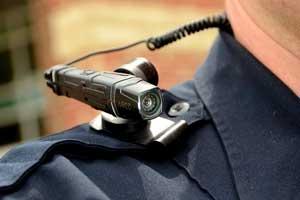 The New York Police Department’s long-anticipated plan to outfit its officers with body cameras is being rolled out this month. Some critics are trying to block it. About 50 officers working the 4 p.m. to midnight shift in Manhattan’s 34th Precinct will be the first to add body cams to their standard uniforms. “We have hit the point where we really can’t learn anymore by reading and talking,” said Assistant Commissioner Nancy Hoppock of the NYPD’s risk management bureau. The NYPD’s policies do not vary much from those adopted years ago by Fayetteville Police. The FPD was one of the first major North Carolina city police departments to outfit its patrol officers with cameras. As in New York, policy does not require that cameras record all police encounters, despite the potential for low-level encounters to quickly escalate.
The New York Police Department’s long-anticipated plan to outfit its officers with body cameras is being rolled out this month. Some critics are trying to block it. About 50 officers working the 4 p.m. to midnight shift in Manhattan’s 34th Precinct will be the first to add body cams to their standard uniforms. “We have hit the point where we really can’t learn anymore by reading and talking,” said Assistant Commissioner Nancy Hoppock of the NYPD’s risk management bureau. The NYPD’s policies do not vary much from those adopted years ago by Fayetteville Police. The FPD was one of the first major North Carolina city police departments to outfit its patrol officers with cameras. As in New York, policy does not require that cameras record all police encounters, despite the potential for low-level encounters to quickly escalate.
Anthony Kelly, Fayetteville’s interim police chief, said cops are to turn on their cameras as they arrive on the scenes of incidents that are not clear to them. Once they determine situations are not confrontational, they can turn them off. “But the cameras are to be reactivated as soon as officers sense something may go sideways,” said Kelly. It’s a judgement call, but Kelly noted poor judgment can be disciplined. The devices automatically record whatever occurred thirty seconds before they were turned on, he added.
It would be cost prohibitive for officers to record every minute of their tours, officials said. “The initial purchase (of the cameras) included storage … for a period of 5 years,” said Lt. Todd Joyce. Use of the Microsoft Cloud for video and audio storage costs $77,100 per year for a period of 5 years, or $385,500, he said.
Officers have no control over downloading, editing or storage. Camera content is downloaded automatically as officers end their tours of duty. They may view video recordings before writing up their reports to make sure they are in sync. NYPD critics say that would allow officers to tailor their version of events to what was recorded and undermines the cameras’ effectiveness as an accountability tool, and contradicts transparency.
“Reality-based training has revealed that stressful situations can result in incomplete recollection,” Chief Kelly countered, so he said it makes sense for officers to review recordings in those instances. State law does not allow the general public to view video of controversial situations. Victims and others portrayed in videos, as well as accused perpetrators, can view recordings during supervised screenings. It takes an order from a district court judge for a video to be released to the public.
Police body cameras “increase officer safety and reduce department liability,” according to Law & Order magazine. The Fayetteville Police Department’s 300 uniformed patrol officers wear them, as do Hope Mills and Spring Lake cops. Body cameras have been embraced by many law enforcement agencies following controversial interactions between officers and suspects. The Fayetteville Police Department has spent more than a million dollars on body cameras, much of it grant money. The cameras are worn on officers’ uniform collars or lapels.

 How to resolve AdBlock issue?
How to resolve AdBlock issue? 








